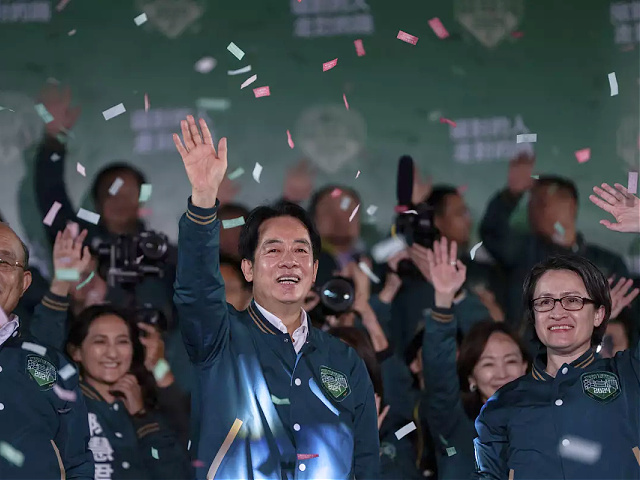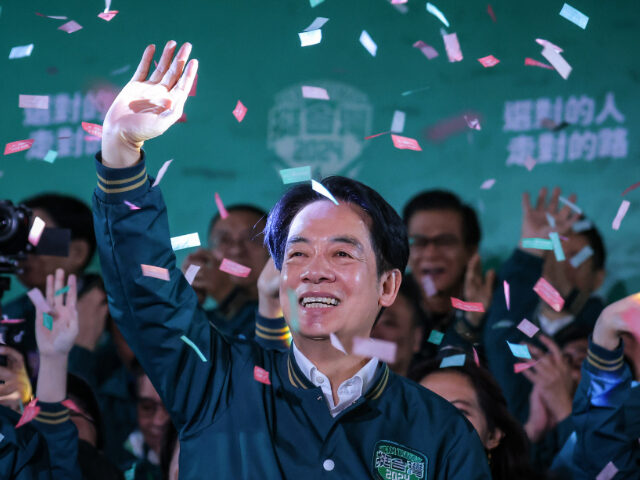Taiwan’s National Security Bureau Director-General Tsai Ming-yen warned the legislature on Monday that China will probably increase its already heavy levels of pressure against the new administration of President-elect Lai Ching-te after his inauguration on May 20.
Director-General Tsai expected China to “push and pull” even harder on every lever of pressure it brought to bear after the election of Lai’s predecessor, Tsai Ing-wen.
China reviled Tsai as a dangerous “separatist” and waged a harsh diplomatic campaign to peel away Taiwan’s few allies. The Chinese sought to isolate Taiwan from international bodies, meddle in its politics, exhaust its morale with relentless “gray zone” tactics, and intimidate it with threats of invasion.

Taiwanese Vice President Lai Ching-te, also known as William Lai, celebrates his victory in Taipei, Taiwan, on January 13, 2024. (AP Photo/Louise Delmotte)
Taiwan’s security chief warned that all of these tactics would intensify as Lai’s inauguration drew near. He said China is already making a push to “normalize” provocative military drills near Taiwan’s waters and airspace, turning gray zone warfare into a weekly event.
Tsai said:
We found that whenever other countries pass resolutions friendly to Taiwan, or foreign vessels pass through the Taiwan Strait, or when foreign dignitaries visit Taiwan, China will coordinate their existing regular patrols to coincide with these diplomatic events.
On the bright side, Tsai said his agency saw no “risky signal that could catalyze a war” before Lai’s inauguration. He said allied intelligence agencies concurred that despite China’s heightened belligerence before the election and a brief flaring of tensions after two Chinese fishermen died while fleeing the Taiwanese Coast Guard in February, there is no indication that Beijing intends to start a war in the near term.
“After all, stability in the Taiwan Strait is also in [Beijing’s] interest and we have noticed that they have employed certain risk control measures following the incident,” Tsai said, as quoted by the South China Morning Post (SCMP).
RELATED — NOT AGAIN… Chinese Navy Ship Harasses U.S. Destroyer During Taiwan Strait Maneuver
Tsai said Chinese dictator Xi Jinping still prefers “peaceful reunification” over invasion, but he is increasingly impatient for reunification to happen, so China will intensify both its efforts to coerce the Lai government and its attempts to lure young Taiwanese to China with economic opportunities. Tsai dubbed this approach “playing soft on one hand and hard on the other.”
Tsai predicted Beijing would terrorize Taiwanese voters by constantly warning that Lai’s policies were making war with China more likely. The goal would be softening up resistance for when China offers “peaceful unification and co-prosperity” as the alternative to confrontation and inevitable conflict.
On the subject of the upcoming election in Taiwan’s chief ally, the United States of America, Tsai said that while prospective candidates Joe Biden and Donald Trump have different positions on security issues, they are both interested in maintaining security and the status quo in the Taiwan Strait.
Tsai noted that both Biden and Trump approved more than ten rounds of arms sales to Taiwan during their respective first terms.
“This shows that no matter who wins the U.S. presidential election, Washington’s policy of containing China while remaining friendly toward Taiwan is not expected to majorly change,” he said.

COMMENTS
Please let us know if you're having issues with commenting.